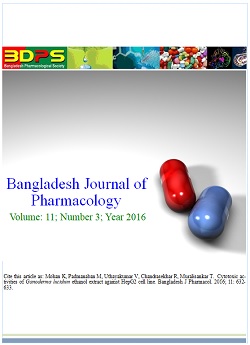Cytotoxic activities of Ganoderma lucidum ethanol extract against HepG2 cell line
References
Lau CBS, Ho CY, Kim CF, Leung KN, Fung KP, Tse TF. Cytotoxic activities of Coriolus versicolor (Yunzhi) extract on human leukemia and lymphoma cells by induction of apoptosis. Life Sci. 2004; 75: 797-808.
MartÃnez-Montemayor MM, Acevedo RR, Otero-Franqui E, Cubano LA, Dharmawardhane SF. Ganoderma lucidum (Reishi) inhibits cancer cell growth and expression of key molecules in inflammatory breast cancer. Nutr Cancer. 2011; 63:1085-94.
Wang Y, Aker WG, Hwang HM, Yedjou CG, Yu H, et al. A study of the mechanism of in vitro cytotoxicity of metal oxide nanoparticles using catfish primary hepatocytes and human HepG2 cells. Sci Total Environ. 2011; 409: 4753–62.
Weng CJ, Chau CF, Yen GC, Liao JW, Chen DH, Chen KD. Inhibitory effects of Ganoderma lucidum on tumorigenesis and metastasis of human hepatoma cells in cells and animal models. J Agric Food Chem. 2009; 57: 5049–57.
Yuen JW, Gohel MD. Anticancer effects of Ganoderma lucidum: A review of scientific evidence. Nutr Cancer. 2005; 53: 11–17.
Zjawiony JK. Biologically active compounds from Aphyllophorales (polypore) fungi. J Nat Prod. 2004; 67: 300–10.

Apply citation style format of Bangladesh Journal of Pharmacology
Copyright (c) 2016 Kannan Mohan, Muthusamy Padmanaban, Venkatachalam Uthayakumar, Ramachandran Chandrasekhar, Thirunavukkarasu Muralisankar

This work is licensed under a Creative Commons Attribution 4.0 International License.
